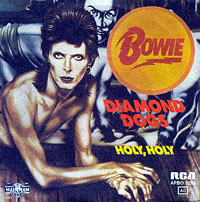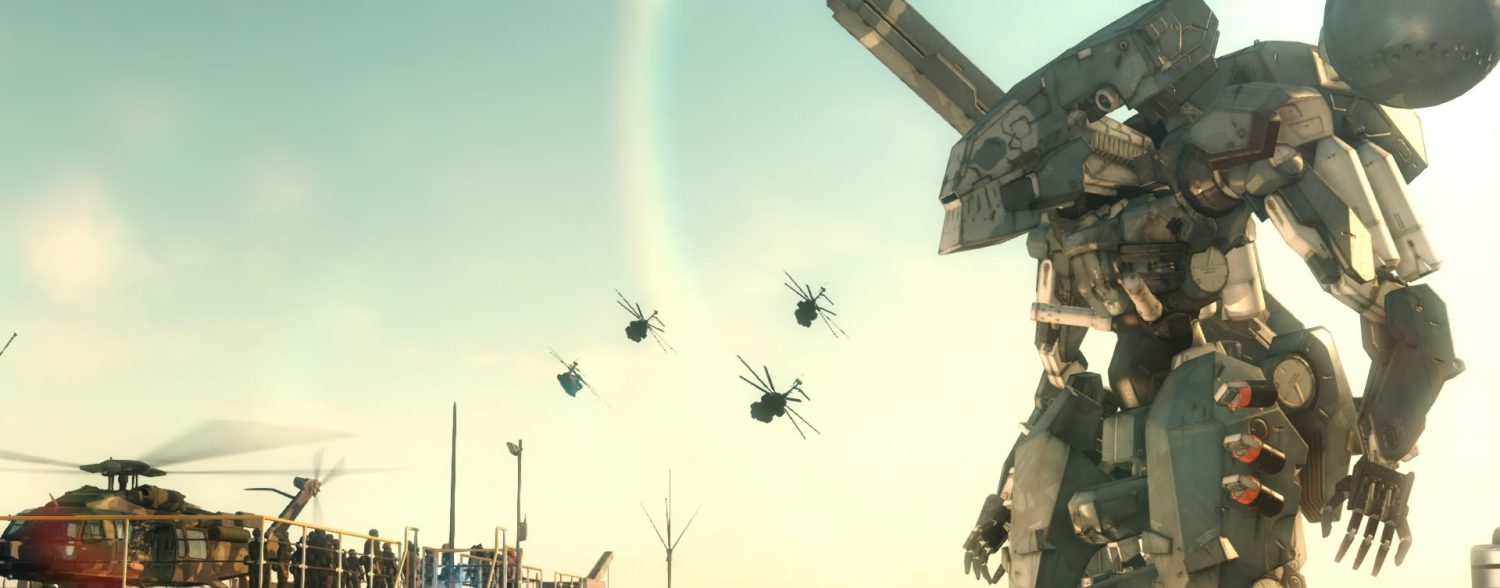Please Note: Spoilers for the games follow.

One’s a British glam-rock icon, who recently passed away. The other’s a stealth-based American/Japanese video game action saga that spans from the Cold War to the present day. Yet there’s a surprising amount of influence from the late singer on the series, mainly due to the fandom of the series’ creator, Hideo Kojima. Although none of the songs of Bowie really appear in the games (apart from one cover) which certainly has its share of licensed music-it’s pretty clear that there’s some surprises. Specifically, it’s very prominent in the series installments dealing primarily with misguided hero, Big Boss/ John/”Jack”/The original Snake.


The Eyepatch-as well as the Snake codename used not only by Big Boss but by his clones and doppelgangers’-that Big Boss wears is mainly acknowledged as being a nod to Kurt Russel’s character Snake Plissken from Escape from New York.

However, I’m still throwing that David Bowie image in there just as a small note before getting to the real, more obvious facts.
GROUND CONTROL TO MAJOR TOM
In the Virtous mission that opens Metal Gear Solid 3: Snake Eater, Major Zero-later a major behind-the-scenes villain in the series, but at this point simply Snake’s CO-initially adopts the code name of Major Tom, which Zero states is a reference to the movie “The Great Escape”, but the implication to the player at least that it’s a reference to the Major Tom character mentioned in “Space Oddity”-especially when one of the game’s radio conversations has Snake state “Can you hear me, Major Tom?” one of the lyrics of Bowie’s song. However, Space Oddity” hadn’t yet been released until 1969, so in the context of the game (which uses a lot of ‘real’ history), this explanation makes sense.

Another radio conversation-Snake’s medical and save support Para-Medic, is a movie buff, and she often brings up various movies and ask’s if he’s seen them, often relating the plot of the films (Which often relate to the plot of the game itself). Many are films we are familiar with from that time period-From Russia With Love, Godzilla,20,000 Leagues Under the Sea…one such film, however, does not exist, and is a bit of a joke: “My Mother was a Teenage Spider-Queen from Mars.” This fake movie’s title is an homage to Bowie’s album: The Rise and Fall of Ziggy Stardust and the Spiders from Mars.

SPACE ODDITY

In both Metal Gear Solid III and it’s chronological sequel Peace Walker, we learn that Snake’s Mentor Joy/The Boss was part of the space race as a astronaut (although one deleted from the history books), and a member of her cobra unit, The Fury, was also one (although a Cosmonaut). Both had serious experiences in space, and accidents which shaped their philosophies. The Boss’s, in particular, becomes a important plot of the overarching plot of the series, the plan to unite the world.
One of the Fury’s lines is “I’m coming home!”, which is a reference to another “Major Tom”-related song, although one not sung by Bowie, but from the 80’s tribute song from Peter Schilling, “Major Tom, I’m coming home”.
In fact, “Ashes to Ashes” and “Space Oddity” were going to be used in the closing credits for Metal Gear Solid III, but perhaps due to high licensing fees, or a veto from David Bowie himself, they were instead replaced by the band Starsailor’s “Way to Fall”, which arguably fits the game’s ending even better.
From The Man Who Sold The World
(Major spoilers for The Phantom Pain follow).
Bowie songs and references largely skip Metal Gear Solid IV and Peace Walker, the latter in particular surprisingly choosing the song from Karen Carpenter “Sing a song” and Japanese songs sung using the “Vocaloid” voice simulator (popularized by “Hatsune Miku”), as well as an original tune sung by the character Paz.
The Bowie references return in “Metal Gear Solid V: The Phantom Pain.” The revived mercenary business of Snake/Big Boss, Ocelot and Miller is named “Diamond Dogs” referring to the 1974 Bowie Album (Curiously 1974 was also when Peace Walker was set).


The one-eyed wolf pup that Diamond Dogs raises to be Snake’s field scout is also given the initial “Diamond Dog” (Or D-Dog for short).

Although more or less another reference to Schilling’s “Major Tom” sequel, when villain Skull Face gets crushed by the Metal Gear Selanthropus, he states “Major, I’m burning up!” (a reference in-game to his one-time leader Major Zero, who went by Major Tom during the virtous mission/Metal Gear Solid V).

Perhaps the most major one is “The Man Who Sold the World”. The song version that is used in the game is an early 80’s cover by Midge Ure of the band Ultravox (Which Kojima is also a fan of, as might be documented in a future article), but it uses the original Bowie lyrics and tone, although with a slightly more 80’s synth theme.
It first appears on the radio as “Big Boss”(In fact a medic assigned to Big Boss’s helicopter, but surgically altered and brainwashed to serve as Big Boss’s body double, with the real big Boss next to him in recovery) awakens from a nine year coma.

The reference to the Garbage song is credits for one of the game’s trailers. I just need a screencap with a clear shot of the radio).
The cover also is a playable cassette during the game and can be set as the tune for the Diamond Dog’s “Pequot” helicopter.
The theme of The Man Who Stole The World is an important one, as it deals in part, with multiple personalities. Bowie, of course, had many different styles and personas throughout his career (Something often used by artists even now, including Lady Gaga who recently sang a tribute to Bowie at the Grammys) 
The lyrics go like this:
We passed upon the stair, we spoke of was and when
Although I wasn’t there, he said I was his friend
Which came as some surprise I spoke into his eyes
I thought you died alone, a long long time ago
Oh no, not me
I never lost control
You’re face to face
With The Man Who Sold The World
I laughed and shook his hand, and made my way back home
I searched for form and land, for years and years I roamed
I gazed a gazely stare at all the millions here
We must have died alone, a long long time ago
Who knows? not me
We never lost control
You’re face to face
With the Man who Sold the World

In the context of the game, the lyrics “I thought you died a long long time ago” could refer to the near-fatal helicopter crash which put “Venom Snake” (as the medic Doppelganger is referred to) on his path to being a double for “Big Boss”, and also the hospital escape scene, where “Ishmael” (Big Boss, in bandages to hide his own face) guides “Ahab” (Venom Snake) to safety. Of course, the nicknames they choose refer to “Moby Dick”, but that’s a whole other blog post that I could work with that on 🙂 : After which “Ishmael” vanishes (In fact, recovered earlier by Ocelot and told to lay low for a while while “Venom” takes over as “Big Boss”.). In the second set of verses, Bowie/Ure’s “I” turns to “We”, and this probably refers to the point at the end of the game, where it’s finally revealed that Venom is not, in fact, who he thought he was, but still Big Boss in a sense, as the real Big Boss reveals, in a cassette tape sent to him marked “From the Man Who Sold The World”.
“Now do you remember who you are, what you were meant to do? I cheated death thanks to you. And thanks to you I’ve left my mark. You have too. You’ve written your own history. You’re your own man. I’m Big Boss, and you are too. No, he’s the two of us together. Where we are today, we built it. This story, this ‘legend’, it’s ours. We can change the world, and with it, the future. I am you and you are me. Carry that with you wherever you go. Thank you, my friend. From here on out, you’re Big Boss.”
– Big Boss, MGSV
This of course eventually leads to the original two MSX games, in which both Big Bosses battle the original Snake’s son/clone, Solid Snake….and the rest of history.
Of course there’s a lot more to be said about Metal Gear’s music, from the original 8-bit background music, to the legendary music that first debuted on the playstation games (including the popular “Snake Eater” theme, as well as the original themes of Donna Burke, to the other 80’s cassettes and songs that form Phantom Pain’s licensed soundtrack.
But that’s for another time…
